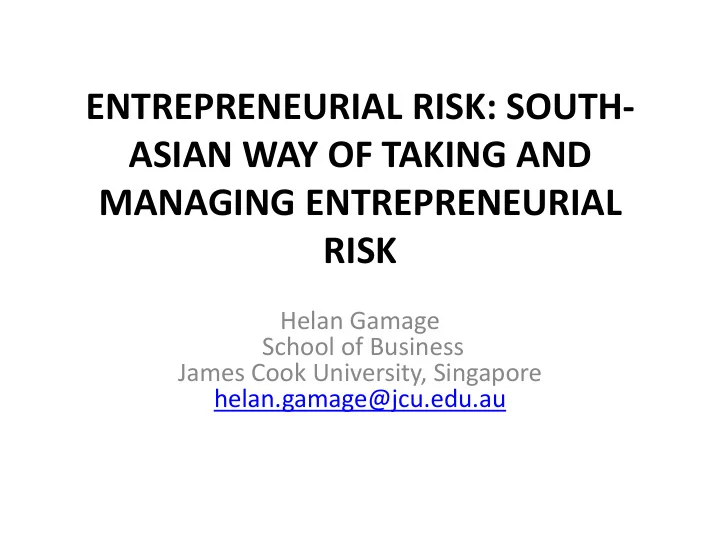

ENTREPRENEURIAL RISK: SOUTH- ASIAN WAY OF TAKING AND MANAGING ENTREPRENEURIAL RISK Helan Gamage School of Business James Cook University, Singapore helan.gamage@jcu.edu.au
Focus of the paper • to address the context sensitive paradox by examining entrepreneurial risk (ER) through the lens of social, cultural, political and economic and decision making.
Research context • South Asian context: • Sri Lankan entrepreneurs who started up home-based businesses and which have grown to become significant in Sri Lankan society.
Reality of the Context • Inherited socio-cultural behaviours with the civilization and changed by colonization, are presented in contemporary life in Sri Lanka. • The socio-cultural elements /system : family, caste, ethnicity, class, religion and education bring about specific roles for individuals to perform. • The roles for an individual and the resultant social actions can be understood in the context of deep- rooted values and beliefs.
The historical foundations of Sri Lankan culture: Three epochs: 1. Civilisation as a culture-building force 1. Colonisation as a manifestation of new cultural behaviours 1. An independent nation with dynamic cultural behaviour
Entrepreneurial world: objective and subjective nature of its reality
Ontological facet of this paper. • Entrepreneurial social reality of risk taking and management requires the fundamental philosophy of subjectivism Therefore, methodological orientation: • utilizes Holism qualitative inductive case study methods. • The complexity of entrepreneurial reality was captured in case studies through inductive data generation strategies and by interpretations around a particular timeframe.
Bottom up approach
Findings: Theoretical Reflections on Diversity of Culture and Entrepreneurial Risk Five main themes: 1. An independent nation with dynamic cultural behaviour • Dark side of risk taking: ER from socially driven uncertainties • Missing links: The social disorder
2. Perceptions and management of ER • Social confrontation: Guilty or Shame – Social confrontation: accepted as a personal risk • Business challenges as shared risks: Collectivism: 3. Risk tolerance behaviour: Religious influence on risk: Luck and Karma
Risk Management: • Social power and conceptualisation skill • Irrationality in rational risk taking – Disregard for entrepreneurial risk handling through rational approaches
Contextually driven model for South-Asian way of taking and managing entrepreneurial risk
Conclusion • The research data indicate that entrepreneurs do indeed use their social wisdom and cultural understanding more in their decision making. • In this research work found that in the South Asian cultural context social wisdom and value judgment is prominent and essential in understanding, tolerating and managing uncertainty and risk which are driven from socially and culturally. • Sri Lankan businesses cannot survive by merely following entrepreneurial orthodoxy within the western paradigm, which does not lead to appropriate practices because conflicts and challenges are palpable.
Suggested Further reseach • This model is driven by the one of the South – Asian contexts and this model could to be reexamined in other cross cultural perspectives make it more meaningful to the South – Asian context.
Recommend
More recommend